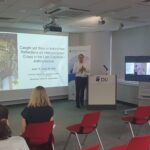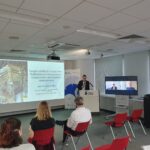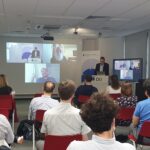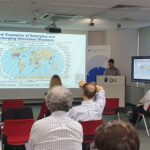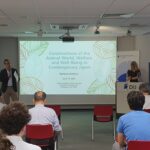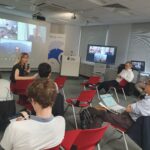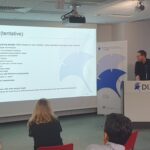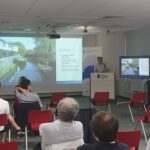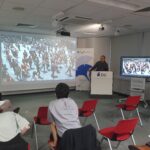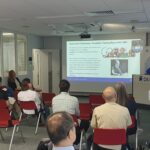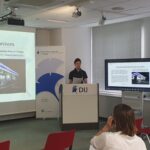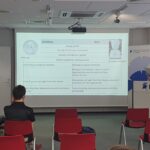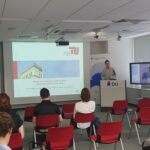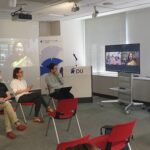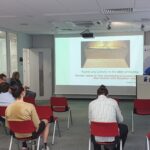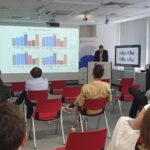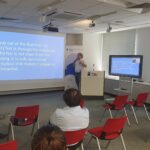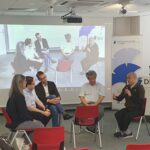
Co-organizer
Supported by DWIH Tokyo (German Centre for Research and Innovation Tokyo)

Anmeldung
This is a past event. Registration for this event is no longer possible.
DIJ Mailing List
Please subscribe below to stay informed about our research activities, events & publications:
Caught yet blind in Indra’s Net: Reflections on Interconnected Crises in the Late Capitalist Anthropocene
15. Juni - 16. Juni 2023
With the Global Financial Crisis of 2007/08, the Covid-19 pandemic, and the Russian invasion of Ukraine in February 2022, the opening decades of the 21st century has already been a period of global crises. While these three crises emerged out of what are commonly conceptualized as different spheres of human activity (economics, human-nature relationships, politics/ideologies), they have demonstrated not only the transnational economic, political, and social interconnectedness of human societies, but also the connections between the human and the non-human worlds, as well as between the realms of ideas and of physical existence.
These connections and mutual influences are of course well known. More holistic approaches to address them have already been introduced. One Health, for example, explicitly takes into consideration that human health rests on a healthy environment. However, there is a tendency to develop such new concepts by building on European discourses hinged on nature/culture distinctions that differentiate between human and nonhuman worlds. The widely discussed Sustainable Development Goals (SDGs) demonstrate this. This has of course its practical merits. Political authority is just as limited as capital to pursue more sustainable practices or the willingness of interest groups to support them, which makes a portfolio or building block approach to sustainability most practical. Yet, the past crises have shown the limitations of such approaches.
The philosophical traditions of South, East, and Southeast Asia know the metaphor of Indra’s Net (Sanskrit: Indrajāla, Japanese: indara-mō因陀羅網) to express the fundamental interconnectedness and interdependence of all existence. With this frame as an inspiration, this workshop explored holistic multispecies worldviews stemming from intellectual traditions found across South, Southeast, and East Asia. Instead of remaining within Indra’s Net of inescapable interconnection and interdependence while remaining blind to it, this workshop critically connected recent theoretical debates to concrete case studies in order to advance programs for achieving social and environmental justice.
Thursday, 15 June 2023
13:00 Welcome and Introduction
Franz Waldenberger (DIJ)
David M. Malitz (DIJ)
Milinda Banerjee (St. Andrews)
13:15 Keynote: Joseph S. Alter (Professor, Director of the Asian Studies Center, University of Pittsburgh): Paramahansa and the Maya of Things: Enlightened Sages, Bar-headed Geese, and the Swan Song of Transcendence
14:30 Panel 1: Multispecies Entanglements
Chair: Joseph S. Alter (University of Pittsburgh)
Barbara Holthus (Deputy Director, DIJ): Constructions of the Animal World, Welfare, and Well-Being in Contemporary Japan.
Milinda Banerjee (Lecturer, University of St. Andrews): Multispecies Democracy: Towards a Global Intellectual History
Yamazaki Wataru (Professor, Kyoto University): Socio-ecological Background to the Frequency of Emerging Infectious Diseases: The Need for a Planetary Health Approach as an Effective Countermeasure.
16:30 Panel 2: Economic Entanglements
Chair: Franz Waldenberger (DIJ)
Markus Heckel (Principal Researcher, DIJ): Sustainable Consumption: Comparing Japan and Germany.
Takahashi Takuya (Professor, The University of Shiga Prefecture): Ohmi-Merchants and the Threefold Satisfaction (Good for Seller, Buyer, and Society): A Japanese Tradition of CSR and SDGs.
Akkanut Wantanasombut (Researcher, Chulalongkorn University): Itthibath Si and a Thai Approach to Social and Solidarity Economy: A Case Study of Tamsang-Tamsong.
Friday, 16 June 2023
8:30 Panel 3: Social Entanglements
Chair: Nora Kottmann (DIJ)
Shuvatri Dasgupta (Associate Lecturer, University of St. Andrews, and PhD Student University of Cambridge): A Brief History of Women and Care: Ecofeminism and Multispecies Wellbeing in Colonial India.
Isaac Gagne (Principal Researcher, DIJ): Listening to the Community: Grassroots Mental Healthcare in Local Communities.
Arisa Ema (Associate Professor, University of Tokyo) and Celia Spoden (Senior Research Fellow, DIJ): Staying Connected: Telepresence Robots at School in Japan and Germany.
Kevin Wiggert (PhD Student, Technische Universität Berlin) and Martin Meister (Lecturer and Researcher, Technische Universität Berlin), Robots as Co-Workers in Care Facilities? Cases from Germany and Japan.
10:30 Panel 4: Brahma’s Net – Buddhist Entanglements
Chair: Akkanut Wantanasombut (Researcher, Chulalongkorn University)
Soraj Hongladarom (Professor Emeritus, Chulalongkorn University): Breaking out of Brahma’s Net: Achieving a Pathway through the Ecological Crisis.
Chayanin Nuisin (PhD Student, Chulalongkorn University): Rights and Liberty in the Mist of Karma: Secular Values in the Thai Constitutional Context and their Tension with Buddhist Values.
David Malitz (Senior Research Fellow, DIJ): Uncanny Parallels: The Buddhist Dharma between the Silicon Valley and Bangkok Barracks.
12:00 Closing Remarks
